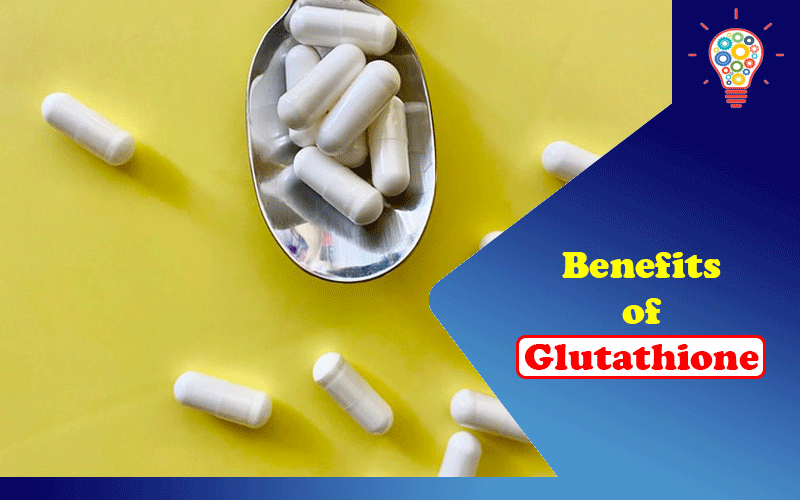The global glutathione (GSH) market had an estimated value of $195 million in 2020. Experts believe it will further grow at a compounded annual rate of over 7% up until 2027.
One reason for glutathione’s fame is that science backs some of its touted benefits. In fact, it’s been the subject of many studies since its discovery in 1888 and even up to now.
So, what exactly are the benefits of glutathione? How does it work, and what conditions may it be helpful for?
We’ll answer all these questions in this ultimate guide to glutathione benefits, so be sure to read on!
Table of Contents
1. Scientists Regard It as the Master Antioxidant
According to scientists, glutathione is the master antioxidant. One reason is that it’s in almost every cell in the body. It’s also among the most abundant antioxidants (AO) found in these cells.
Antioxidants are molecules that combat harmful free radicals in the body. The body produces some AO on its own, but you can also get them from food and supplements.
Free radicals can be harmful as these are unstable atoms that can damage cells, proteins, and DNA. They can cause a domino reaction by stealing electrons from other molecules in the body. These molecules then become unstable and also transform into free radicals.
What’s more, high levels of free radicals can result in oxidative stress. Oxidative stress occurs when free radicals outnumber antioxidants present in the body. Over time, this phenomenon may give rise to diseases like diabetes and arthritis.
So then, as a master antioxidant, what is glutathione good for?
First, it helps reduce oxidative stress caused by high levels of free radicals in the body. This can help lower your risks of developing diseases linked to oxidative stress.
As the master antioxidant, the benefits of glutathione may apply to nearly all the cells in the body.
2. May Help Combat Visible Signs of Skin Aging
Free radicals also seem to play a role in the development of skin aging signs, such as fine lines and wrinkles. One way that they may affect the skin is by damaging collagen and elastin. Both are types of fibers that make up the skin’s supporting structure.
Collagen, elastin, and glutathione all decrease as a person ages. That’s why all three are also popular ingredients in supplements.
Researchers found that glutathione supplementation can cause a significant reduction in wrinkles. They also found some evidence that GSH can help boost skin elasticity.
However, the same group of researchers noted how taking GSH caused skin-lightening effects. Other than this, though, the participants didn’t report any adverse side effects.
3. Plays a Role in the Body’s Fat Burning Process
Researchers say that chronic glutathione deficiency can impair the body’s fat-burning process. The lower the GSH levels in the body, the less fat it burns and the more fat it may store. As such, correcting low GSH levels may help counter age-related weight gain.
Do note that glutathione is not a replacement for a healthy diet and exercise. Instead, it may help keep your weight in check as you trim the pounds with proper diet and physical activity.
4. May Help Boost Liver Health
The liver is the organ with the highest glutathione content. However, oxidative stress caused by liver diseases can deplete GSH levels. Having too low GSH levels may also worsen liver diseases and raise liver injury risks.
A 2016 review found that glutathione administration may be helpful for liver conditions. It may be a useful addition to treating liver damages caused by oxidative stress. It may also play a role in treating alcoholic and non-alcoholic liver diseases.
5. May Be Useful for People With Diabetes
People with type 2 diabetes tend to be deficient in glutathione. This is especially evident in patients who also have macrovascular diabetes complications. Macrovascular diseases include atherosclerosis and coronary artery disease.
For those reasons, scientists believe that improving GSH levels may help diabetes patients. One reason is that glutathione may improve how their bodies use glucose. This master antioxidant also seems to help enhance the body’s sensitivity to insulin.
6. May Boost Circulation in Patients With Peripheral Artery Disease
Peripheral arteries are the blood vessels that serve the head, arms, stomach, and legs. Fatty deposits clog these arteries, making them narrower. This condition is what doctors call peripheral artery disease (PAD).
PAD can affect any peripheral artery, but it’s most common in the legs.
A study found that glutathione helped boost circulation in patients with PAD. As a result, the patients said they were able to walk pain-free or walk for longer distances.
7. May Help Ease Rheumatoid Arthritis Symptoms
Rheumatoid arthritis (RA) is an autoimmune disease that can cause oxidative stress. Oxidative stress can, in turn, aggravate this existing condition. What’s more, scientists have yet to find a cure for autoimmune diseases.
The good news is that diseases of the immune system are often controllable. For example, a study found that glutathione can reduce oxidative stress in people with RA. The antioxidant also helped improve inflammation in the patients.
For those reasons, the researchers believe that GSH may be helpful as a supplement for RA therapy. Scientists are also looking into how glutathione may benefit other autoimmune diseases too.
Give These Benefits of Glutathione a Well-Deserved Shot
There you have it, your ultimate guide to the many benefits of glutathione. Now, you know that it’s the master antioxidant and that it may be helpful for many different health woes.
However, as beneficial as glutathione may be, it may still cause side effects. So, be sure to talk to your doctor first before you start taking GSH supplements.
Interested in more health, fitness, and lifestyle tips and tricks? Then please feel free to browse our other categories for more guides like this!

